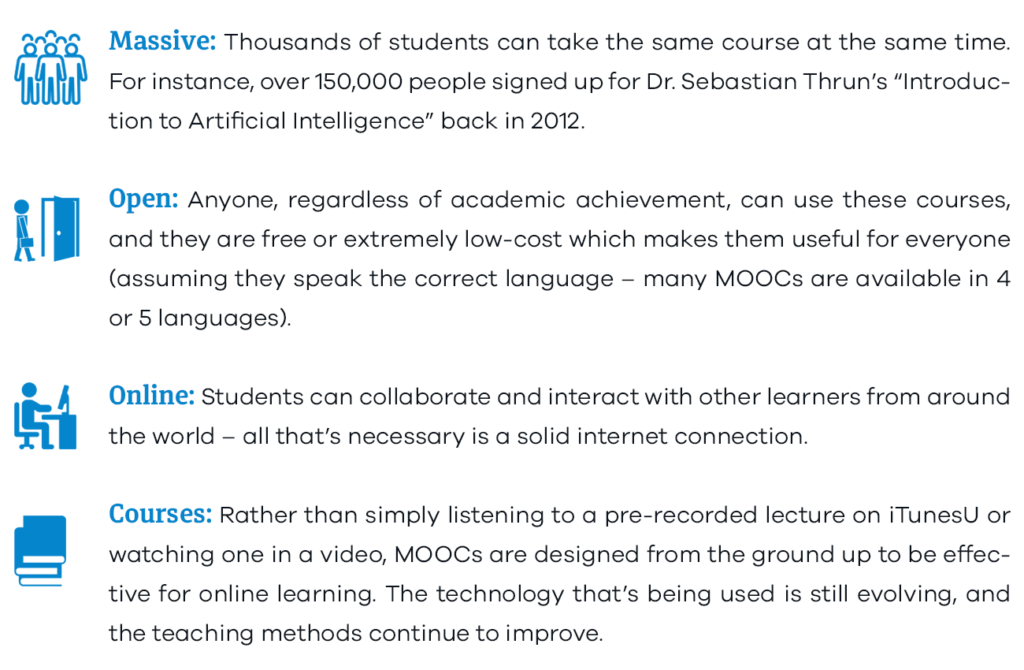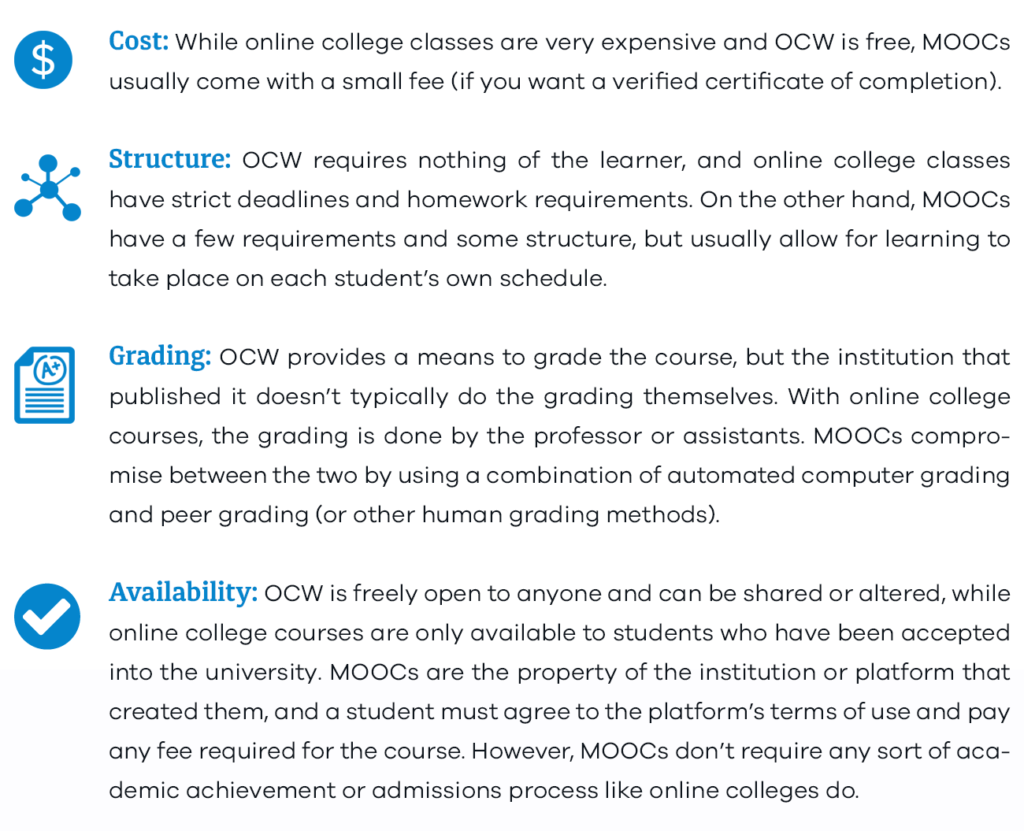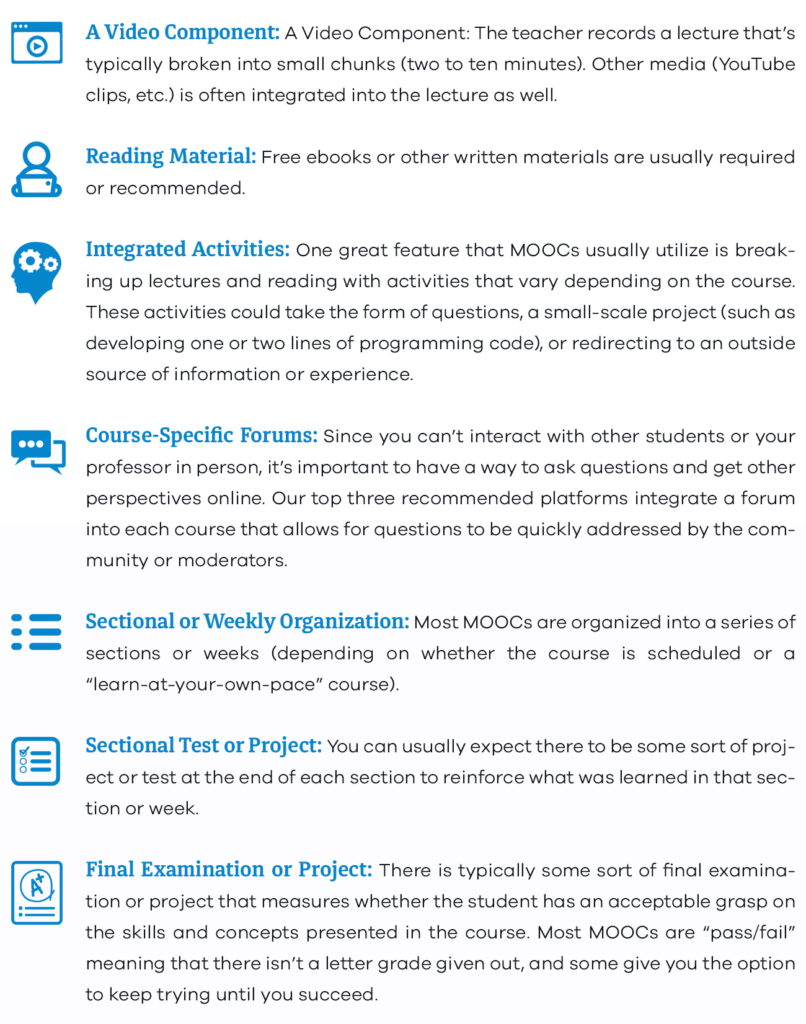Massive Open Online Courses (MOOCs) | Teaching Aptitude
Get Study Materials of General Studies for UPPSC ⇒ DOWNLOAD NOW
A massive open online course (MOOC) is an online course that has open access and interactive participation by means of the Web. MOOCs provide participants with course materials that are normally used in a conventional education setting – such as examples, lectures, videos, study materials and problem sets.
Apart from this, MOOCs offer interactive user forums, which are extremely useful in building a community for students, TAs, and professors. Generally, MOOCs do not charge tuition fees or provide academic credit.
Massive Open Online Courses (MOOCs)
Techopedia explains Massive Open Online Courses (MOOCs)
MOOCs are a recent progression in distance education. The concept of MOOCs originated in 2008 among the open educational resources (OER) movement. Most of the initial courses were influenced by connectivist theory, which emphasizes that knowledge and learning arise from a network of relationships or connections. 2012 was a big year for MOOCs, as the industry attracted significant media buzz and venture capital interest. Numerous providers have emerged that are affiliated with top universities; some of these include edX, Coursera and Udacity.
UNIT I – Teaching Aptitude (Click below on the topic to read the study
notes)
|
Some of the advantages of a MOOC are as follows:
- No tuition fees
- Open access, exposing top-level professors at schools that would otherwise be unavailable to much of the World’s population
- Open courses for all interested, regardless of location, resulting in a more diverse student base
- Collecting data via computer programs helps closely monitor the success and failure of each student. Traditional classroom participation cannot offer this type of precise information.
- Some enthusiastic professors have found global sharing of knowledge more appealing. Many acknowledge that MOOCs help them re-evaluate their pedagogical methods while improving knowledge sharing.
One drawback is the low course completion rate. Some studies have shown that courses are completed by as few as 10 per cent of the huge volume of students that join the MOOC.
Basics of MOOCs

To better understand what a MOOC is, take a deeper look into the meaning behind the acronym:
What sets MOOCs apart from other distance learning options?
Before MOOCs came on the scene, there were two other basic types of distance learning: OpenCourseWare (OCW) and online college classes – both are at opposite ends of the spectrum. OCW is basically just a publication of an institution’s course material online.
The material can be used by anyone and even edited (as long as proper attribution is made). Many consider OCW to be the predecessor to MOOCs as they share the same goal of making quality education accessible to everyone.
Conversely, online colleges provide a structured university class online. The students must be enrolled in the university and are paying tuition and receiving grades as they would if they physically attended the class.

MOOCs are a kind of middle ground between the two extremes. Here are some of the main differences:
Basic Features of Most Quality MOOCs

Most MOOCs offered by quality platforms share the common components:
How to use MOOC?
Enrolling and taking a MOOC can be broken down into five steps.
Step 1: Choose your platform
Like we mentioned earlier, not all platforms provide the same quality of MOOCs. For instance, there were 19 platforms that we considered, and only six survived the cuts. Of those six, only three stood above the rest after our evaluation. It’s a good idea to compare MOOCs between the top three we recommend and find the courses that fit your needs.
Step 2: Create an account
Signing up for an account is a free process – all you need is an email address. Keep in mind that some platforms may require a subscription to access certain content. For instance, if you want to take a specialization (a group of MOOCs) from Coursera, you will need to provide payment information, and you will be charged monthly at the end of a free trial.
Step 3: Decide how you want to learn
There are three basic ways to approach taking a MOOC:
- Audited Course: You can audit a course to learn for your own benefit. Auditing can typically be done for free, but don’t expect to receive a certificate (definitely not an ID-verified certificate). In this scenario, finishing the course isn’t always important as you may be taking the course simply out of curiosity or for the fun of it.
- Certified Course: This approach involves completing a specific course to receive a certificate (verified or unverified). Since there’s usually a monetary investment, completing this course is more important, and you won’t gain any certification if you don’t.
- Specialization: MOOCs offer specializations (or learning pathways) that consist of a series of courses. If you successfully complete the specialization, you will receive a special certification (although some platforms require you to pay for the certificate).
Step 4: Enroll in a MOOC
MOOCs can either be scheduled (meaning there are a start and end date) or “on-demand” (meaning that you can learn on your own time and at your own pace). Scheduled courses may require assignments to be completed by a certain date or time, while on-demand courses can be stretched out over a long period of time.
Step 5: Complete the course
Whether your intention is to fully complete the course or not, our top three recommendations usually allow you to do the work on a desktop, tablet, or smartphone.
Useful links
Social links
Useful links
Contact Us
Address: B 14-15, Udhyog Marg, Block B, Sector 1, Noida, Uttar Pradesh 201301
Alpha-I Commercial Belt, Block E, Alpha I, Greater Noida, Uttar Pradesh 201310



